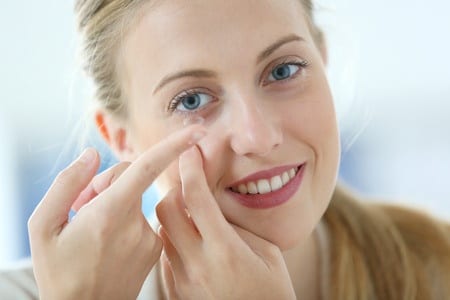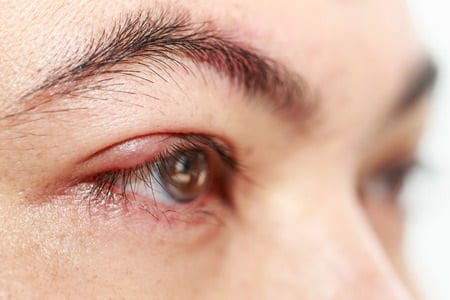Let’s talk about blue light. As we spend more time on digital devices, we are exposed to blue light more than we ever have been before. You may have heard news reports about digital eye strain or your ophthalmologist may have even cautioned you to check your exposure. If you have questions about blue light, we are here to help.
- What is blue light? We all remember learning in elementary school that there is a spectrum of color for sunlight. If you aim a beam of light through a prism of glass, you’ll see the white light divide into all the colors of the rainbow. Blue light is a natural part
 of the sun’s light. It has the shortest wavelengths and the most energy. It is also artificially produced by digital devices like computer screens, tablets, phones and other electronics.
of the sun’s light. It has the shortest wavelengths and the most energy. It is also artificially produced by digital devices like computer screens, tablets, phones and other electronics. - How does blue light affect your eyes? Your eyes are naturally good at filtering light. Less than one percent of UV radiation makes it the cornea of your eye, but blue light is a different story. This wavelength can penetrate to the retina at the back of the eye. Research has shown that too much blue light can damage your retinas and cause other eye conditions like macular degeneration.
- Can you get too much blue light exposure? We don’t know how much blue light exposure is too much. Studies have shown that blue light does contribute to digital eye strain. It causes that annoying feeling you get after a long day of work at the computer when your eyes are itchy, sore and generally worn out. Blue light reduces contrast, which makes it harder for your eyes to focus, and causes this strain.
- How can you protect your eyes? Watch how often you are using electronics (especially in the evening hours when exposure can throw off your circadian rhythm), and how close you hold your devices to your face. If you spend a great deal of time with digital tools, talk to your eye doctor about blue light glasses. These glasses have a special anti-reflective coating that helps reduce glare from digital devices.
Blue light isn’t bad for you, in the right amounts. If you are ready to take charge of your eye health, talk to your eye doctor about managing your blue light exposure. You can start simply by taking a break from screens a few minutes every hour, limiting your electronic use in the evening and spending more time outdoors. All of these tips are great ways to start taking care of your eyes from our digitally overloaded world. If you need more help, come and see us!


 Do you know how to care for your contact lenses? Chances are, you have some questions. Most people do. But it’s important to ‘clear up’ any misconceptions, because keeping clean contacts is of top importance for maintaining good vision and healthy eyes.
Do you know how to care for your contact lenses? Chances are, you have some questions. Most people do. But it’s important to ‘clear up’ any misconceptions, because keeping clean contacts is of top importance for maintaining good vision and healthy eyes.
 Can you get sunburned eyes? The short answer is YES. You can get sunburned not just on the eyelids and skin around your eyes, but also on the cornea (on the front part of your eye) and whites of the eye. Really!
Can you get sunburned eyes? The short answer is YES. You can get sunburned not just on the eyelids and skin around your eyes, but also on the cornea (on the front part of your eye) and whites of the eye. Really!
 Today, we’re shedding some light on a problem that we sometimes see at our practice: the eyelid stye.
Today, we’re shedding some light on a problem that we sometimes see at our practice: the eyelid stye. Do you ever wake up with red, itchy eyes, or just have a day where you feel like your eyes are dry and irritated?
Do you ever wake up with red, itchy eyes, or just have a day where you feel like your eyes are dry and irritated? Do you know when to schedule an eye exam? Do you know what symptoms warrant a visit? Should you bring a friend to drive you home? Today we answer all of those questions, and more.
Do you know when to schedule an eye exam? Do you know what symptoms warrant a visit? Should you bring a friend to drive you home? Today we answer all of those questions, and more. Is eye strain a disease? No. What we think of as eye strain is a set of unpleasant symptoms that can often be avoided. But we should take note when we experience eye strain, because the condition may give us clues about our vision and overall eye health.
Is eye strain a disease? No. What we think of as eye strain is a set of unpleasant symptoms that can often be avoided. But we should take note when we experience eye strain, because the condition may give us clues about our vision and overall eye health. It’s a fact. Fun in the sun can lead to damage to your vision, if you don’t take the proper care of your eyes and vision. Too much sun can cause eye damage, including macular degeneration, cataracts, photokeratitis, and more. So, what can you do?
It’s a fact. Fun in the sun can lead to damage to your vision, if you don’t take the proper care of your eyes and vision. Too much sun can cause eye damage, including macular degeneration, cataracts, photokeratitis, and more. So, what can you do?
